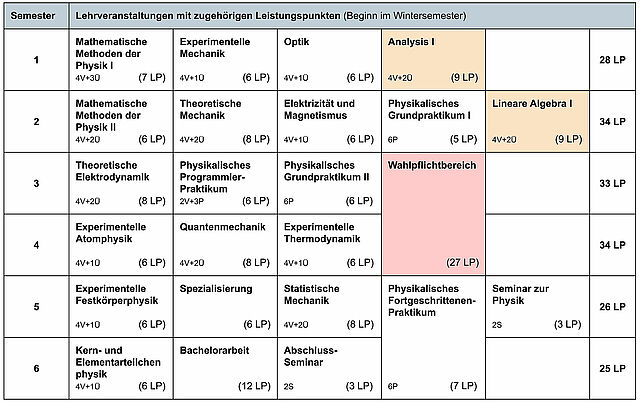B. Sc. Physics
The bachelor's degree in physics offers in six semesters a well-founded overview of experimental and theoretical physics, insights into other subjects and imparts skills in experimentation, numerical methods and analytical skills. The technical and methodological breadth and the general problem-solving skills make physicists very much in demand on the job market.
In Düsseldorf we offer a well-networked course with an excellent supervisory ratio. From the second year of studies onwards, we provide insight into various modern research areas with the opportunity to work there yourself. The bachelor's degree enables you to take on your first tasks in research and development in the professional world. Most graduates, however, join a master’s degree. For particularly ambitious students there is the possibility of studying a second subject at the same time, e.g. Mathematics or computer science, and thus to obtain a second bachelor's degree with just one semester more study effort.
Interested in study
The bachelor's degree in physics is free of admission and can be started in both winter and summer semesters. The bachelor's degree in Medical Physics has restricted admission and only begins in the winter semester. Please note the registration deadlines.
Admission to the master’s degree in physics or medical physics requires a bachelor’s degree in the corresponding or a closely related subject.
Since the 2018/19 winter semester there has also been a bachelor's degree in natural sciences, in which a specialization in physics is also possible.
The three-year bachelor's degree offers you:
- a broad general education in physics (this breadth makes physicists so popular)
- Broad methodical training: experimentation, numerical methods, general problem-solving skills
- the opportunity to acquire further basic mathematical and scientific knowledge in chemistry, computer science, mathematics, etc.
Further skills and abilities:
- In the elective: topics outside of physics from the wide range of the Heinrich Heine University.
- Presentation and discussion of current scientific topics and work.
- Modern and proven techniques for obtaining information, literature and data.
- Independent work on current topics, depending on the inclination, more experimental or theoretical.
After completing a bachelor's degree in physics, you have all the options: a qualified entry into the profession or a master's degree in Germany or abroad with a first academic degree.
A refresher course in mathematics is always offered before the start of the winter and summer semesters. In this course, mathematical basics for studying physics are repeated and deepened. In order to have a smooth start to your studies, participation is recommended.
- There are no admission restrictions for the bachelor's degree.
- The requirement for enrollment is the general university entrance qualification (Abitur). Studying without a high school diploma is also possible under certain conditions.
- Enrollment can take place up to the last working day before the start of the lecture period.
- Enrollment can be requested online from the student and examination administration.
- Enrollment is possible for both the winter and summer semesters.
- If you have any further questions, please contact the Physics Student Advisory Service.
Students
The curriculum is a non-binding proposal for organizing your studies. The material and the learning objectives are divided into thematically closed units (modules), some of which build on one another in terms of content. There are compulsory modules and areas within which modules can be chosen. The objectives, content and modalities of each module are set out in module descriptions. You can find these in the module manual.
One hour per week in the semester corresponds to a 45-minute event by lecturers per week during the lecture period (approx. 15 weeks per semester). One credit point corresponds to a student's total workload of 30 hours (averaged empirical values). An average of 30 credit points are planned per semester. As a rule, each module ends with an examination. The grade is included in the overall Bachelor grade, the weighting being specified in the examination regulations.
The aim of the basic internship I and II is to teach medical physics students the basic skills of scientific experimentation.
Basic internship I: The internship always takes place after the lecture period of a summer semester (september). The duration of the internship is 4 weeks. An additional course is offered in february/march if needed and if enough staff is available.
Basic internship II: The internship always takes place during the lecture-free period between the winter semester and summer semester (february/march). Successful completion of the basic internship 1 is a prerequisite for participating in this internship.
In the advanced internship, the physics students should acquire more in-depth skills in scientific experimentation and also gain an insight into the work of the various working groups.
In the compulsory elective area of the bachelor's degree in physics, you should acquire knowledge in subjects from the mathematical and natural sciences to a total of 27 credit points. According to the curriculum, the courses in these modules should be attended in the 3rd and 4th semester.
Physics students complete their bachelor's degree with the bachelor thesis. In the bachelor thesis, the students should prove their skills and acquired knowledge through their own scientific project.
In preparation for the bachelor thesis, each physics student must first specialize in a physics work group. This means that the students familiarize themselves with a current research topic of the working group, for example by reading a master's or doctoral thesis.
More detailed information on the specialization and the bachelor thesis can be found in this PowerPoint Presentation.
The examination board is acc. § 4 of the Bachelors examination regulations is responsible for the organization of the tasks resulting from the examination regulations.
It usually meets once a year. Its members are acc. Section 4 (2) was chosen.
The examination board includes:
Chairman:
Deputy:
Other members: , ,
Student representatives: ,







